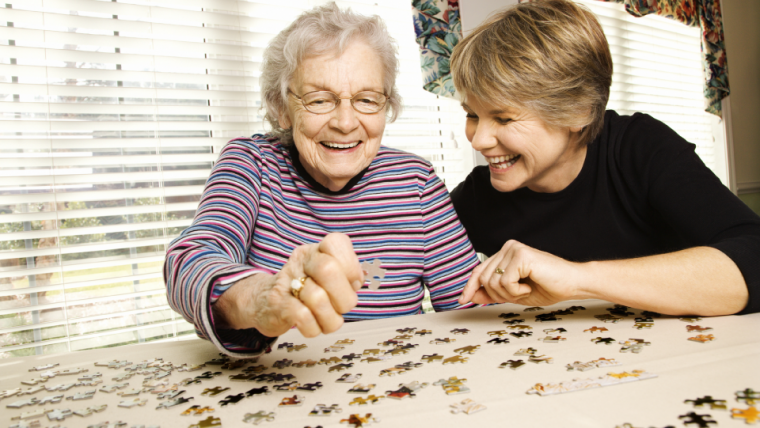Over half of Americans between the ages of 57 to 61 will need to spend at least one night in a nursing home at some point during their life. You’ll want to choose the right nursing home for your loved one.
It is nerve-wracking though, what do you look for? How do you know what questions to ask and what makes a good nursing home vs. one you should stay away from?
We are going to go through a list of questions to ask nursing home administrators. Take this list of questions with you and be sure to ask them when you tour a potential nursing home.
1. How Much Time Does Staff Spend with the Residents on a Daily Basis?
You can’t be with your loved one 24 hours a day. But you also don’t want them left alone for days on end.
Ask the administrators what the average amount of time the staff spends with each resident. The more time staff is around your loved one, the more likely they are to catch anything out of the ordinary and monitor your loved one’s health.
You don’t have to take the administrator’s word for this either. There are resources that allow you to look up all of the facilities by state.
2. What Services Are Offered?
If the facility you love doesn’t offer the services you need, then you can’t pick it. Someone rehabbing from an injury is going to require much more intensive care and physical therapy.
Some other medical conditions require a lot more care. This could be a condition like COPD where the patient needs oxygen to supplement their breathing.
Look for an option that provides a wide range of services. This will ensure that the facility you choose will be able to address any current and future needs.
3. What Are the Staffing Ratios?
There are 1.7 million licensed beds in nursing homes across the country. This is only half the ratio though. It is important to know how many beds, or residents, each staff member is responsible for.
The more patients that each staff member is responsible for, the more likely they are to become overwhelmed. You don’t want your loved one to be one of many where the staff doesn’t have enough time to dedicate the proper attention to each person.
This is how mistakes happen.
4. What Were the Results of Inspections and Surveys of the Home?
Every year data gets published based on inspection of nursing homes. This information is public and should be posted in each facility that you visit.
A quality facility will be lower than average deficiencies. You also want to see certain categories like actual harm, mistreatment, and immediate jeopardy to be passing with no question.
5. What Is the Staff Rate of Turnover?
If the staff has been around for years, this makes for a stable team and environment. This is a good sign and a sign of a well-run facility.
It also means that the same team will be providing continuous care. This allows the staff to get to know the residents on a personal level. They are more likely to notice and address needs and problems sooner.
6. What Procedures Are in Place to Prevent Pressure Sores?
Those that aren’t mobile, or struggle to move, or are totally bedbound are at high risk of developing bed sores. These are pressure sores that develop when someone has laid in the same position for too long.
When these sores develop, they are hard to heal and create a risk for infection.
To prevent these sores from developing, those who are not mobile need to be moved every 2 hours or so.
If the facility you tour does not have a plan in place for pressure sore prevention, this is a bad sign. Even if you’re loved one is mobile, a lack of a plan is a sign that the facility is lacking in patient care.
As an additional question, ask if the beds have special mattresses to prevent pressure sores. These mattresses can relieve the pressure on those pressure points prone to developing sores.
7. What Procedures Are in Place for the Prevention of Infections?
When you have a lot of people living in a confined space communally, germs and disease tend to spread easily. Ask what procedures are in place to protect the residents from the spread of infections or disease.
Some of the biggest threats are MRSA and methicillin-resistant Staphylococcus aureus. These can be deadly if not immediately treated.
One way to help prevent the spread of infectious diseases is to have yearly immunization shots. Another way is to have rigorous hand washing and other cross contamination prevention efforts in place.
8. Are There Special Care Measures in Place for Those Residents with Dementia?
Currently, 5.7 million people live with Alzheimer’s. This number continually goes up with another person developing the disease every 65 seconds.
When it comes to those with dementia, there should be no more than 5 patients per caregiver. This allows for active monitoring and not simply locking patients away.
If the caregivers have special dementia training, this is even better. These people will be able to provide the most comprehensive and complete care.
9. What Happens If I Run out of Money?
According to a study done by George Washington University, the average cost of a private room in a nursing home is $83,000 a year. This is a lofty price tag for most Americans, let alone retirees.
A common problem across the country are sudden and involuntary nursing home evictions. No one wants this to happen to their loved one.
Ask what the safeguards are that are in place to make sure that the situation doesn’t reach this point.
The facility should be able to readily provide the state’s long-term ombudsman’s office contact information.
10. How Do You Ensure All Residents Are Comfortable?
There are about 47 million seniors residing in the US today. This number is expected to double by 2060. While not all seniors live in assisted living.
It’s important to acknowledge that the senior population is diverse and each senior has individual needs. It’s important that the facility you choose recognizes this.
One rising concern that is new in the nursing care world is sensitivity to alternative lifestyles. As the population ages, those who are LGBT seniors may find themselves looking for a community that they feel welcome in.
As this is a new issue for nursing homes to address, not all have staff that has gone through diversity training. If you’re loved one has an alternative lifestyle in any way, you’ll want to make sure that the staff will be able to be understanding.
Otherwise, you risk your loved one feeling alienated and withdrawing socially.
11. What Is the Policy for Mood Alerting Medications?
There was a time when nursing home facilities would use physical restraints to control the residents. Thankfully, this practice was deemed inhumane and abusive and has since been stopped.
However, that doesn’t mean that some less reputable facilities didn’t look to other ways to control the residents. Some facilities will use chemical restraint.
This can be a touchy subject but an important one. You don’t want your loved one to be pumped full of medication to control their behavior.
You can get an idea for the facilities policies by finding out how many patients are currently receiving medication to control their dementia-related behaviors.
This could be an antidepressant, anti-anxiety, or antipsychotics.
By having this tough conversation, you can determine if the drugs are being used to treat the patient’s illness or being used to control their behavior.
If it’s the second, this is an inappropriate use of the drugs. An antipsychotic is really only a last resort medication. A reputable staff will only use it as a last resort and for a limited time. During that time they will monitor the patient closely.
12. Can Residents Make Choices?
It will be a tough transition for your loved one to go from complete freedom and independence to none. Often, someone goes from living in their own home where they could choose when to eat, sleep, and watch tv to a nursing home.
Due to the nature of nursing homes, this freedom isn’t completely possible. However, depending on the facility you choose will dictate just how much privacy and independence your loved one will have to sacrifice.
Will your loved one be able to choose what and when they eat?
How about being able to arrange their room the way that they wish? Are personal items allowed as furnishings?
13. Is the Facility Certified and Accredited?
Ask if the nursing home is accredited by JCAHO. This is the Joint Commission on the Accreditation of Healthcare Organizations.
Accreditation tells you that the facility has been inspected and passed certain safety standards. These standards apply to medication management, disease prevention, and quality control.
You should also ask if the facility is Medicare-certified. If you plan to use this financial assistance, you’ll only be able to place your loved one with a Medicare-approved location.
14. What Are the Official Policies?
So far, we have focused on medical procedures and policies. But these aren’t the only ones you should be asking about.
You can’t assume that all nursing homes have the same policies when it comes to things like smoking, visiting hours, or access to tv and phone.
You also need to ask about the pet policy if your loved one has a beloved Fido.
15. What Are the Facility’s Security and Safety Precautions?
You want to make sure that the facility you select can keep your loved one safe and secure. This means controlling who comes and goes. You don’t want unauthorized people wandering the halls.
You also need to ask about the safety precautions and procedures for things like fire. Are their alarms? How about sprinklers? What is the evacuation plan?
16. What Kinds of Activities and Amenities Are Available?
No one wants to sit around and do nothing all day. This would be depressing and boring.
Staying social and active is a great way to stay mentally sharp. So ask each nursing home what sort of activities they plan and what the onsite amenities include.
This could be an arts and crafts room, or gym, or even a pool. It could also be special events that the facility puts on such as movie night, or trick or treating for Halloween and carolers for Christmas.
17. What Is the Fee Schedule?
Take some time to go through the fee schedule in fine detail. You need to understand what is and is not included in the cost of the home.
Don’t assume that it is all-inclusive. A facility that starts out as a bargain might turn out to be very expensive once all of the add-ons are factored in.
18. What Type of Preventative Care Is Offered?
You want to make sure that not only does your loved one receive quality care, but care that will also prevent them from declining.
Ask about the preventative programs as these are the ones that will ensure your loved one’s health is taken care of into the future.
This could include things like flu shots. It could also include brain function boosting tasks.
Prepare Your Questions to Ask Nursing Home Administrators
Finding the right nursing home for your loved one is all about asking the right questions.
You cannot assume that all facilities will operate the same or have the same procedures and policies.
Know that you have the right questions to ask nursing home administrators you are prepared to start your search. Be sure to jot these questions down and bring them with you. That way you won’t forget anything as this is a lot of information to think about.





